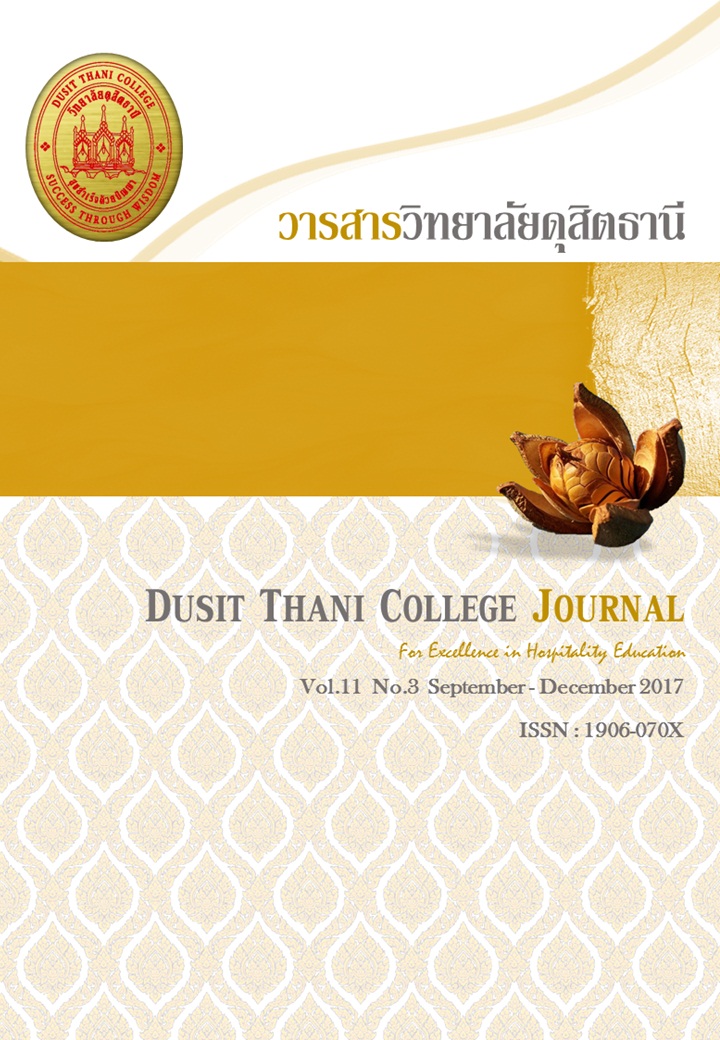The Framework of Social Responsibility in Resort Spa Service: A Case Study of Anantara Sikao Resort and Spa, Trang Province
Main Article Content
Abstract
This research aimed to investigate the expectations on spa standards in alliance with corporate social responsibility from the perspectives of spa’s stakeholders and to propose Spa Standards Framework based on CSR concept. The research employed Thai Spa Standards set by the ministry of public health and the Pyramid of Corporate Social Responsibility concept as the basis of study. Data were collected and analyzed, using qualitative method and the research was conducted at Anantara Sikao Resort and Spa, Trang province. The data obtained using in-depth interviews from 20 participants represented Anantara Sikao Spa’s Stakeholder groups. The research showed that the key stakeholders perceived that social responsibility is of great importance for the development of spa services and operations. The domains of social responsibility they perceived covered economic, legal, ethical, and philanthropic responsibilities. Also, these fives domains of corporate social responsibility were expected to be in alliance with spa standards. Finally, this research proposed “The framework of social responsibility in spa service standards” as a contribution to improve the standards of spa operations in the future.
Article Details
Article Screening Policy
- All research and academic articles to be published must be considered and screened by three peer reviews in the relevant field / article.
- All articles, texts, illustrations and tables published in the journal are the personal opinions of the authors. Editors don't always have to agree. And no responsibility whatsoever is the sole responsibility of the author.
- The articles to be published must never be published. Where did you first publish? And not in the consideration of other journals If the audit found that there has been a duplicate publication It is the sole responsibility of the author.
- Any article that the reader sees as being plagiarized or impersonated without reference. Or mislead the work of the author Please let the journal editor know it will be your greatest blessing.
References
https://www.ditp.go.th/contents_ attach/143532/143532.pdf. วันที่เข้าถึง: 19 มกราคม 2559.
กระทรวงสาธารณสุข. เกณฑ์การรับรองคุณภาพสถานประกอบการสปาเพื่อสุขภาพ. (ออนไลน์).
เข้าถึงได้จาก: https://www.rno.moph.go.th /SSJblog/fda_ranong/spa/kanrubrong.pdf. วันที่เข้าถึง: 20 พฤศจิกายน 2558.
กฤชณัช แสนทวี. (2553). ความคาดหวังของประชากรต่อความรับผิดชอบต่อสังคมขององค์กรธุรกิจ.
วิทยานิพนธ์ปริญญามหาบัณฑิต. มหาวิทยาลัยเทคโนโลยีราชมงคลพระนคร.
ชาย โพธิสิตา. (2554). ศาสตร์และศิลป์แห่งการวิจัยเชิงคุณภาพ. กรุงเทพฯ: อมรินทร์พริ้นติ้งแอนด์พับลิชชิ่ง.
ณัฏฐิรา อำพลพรรณ. (2556). แนวโน้มการท่องเที่ยวเชิงสุขภาพและความงาม. TAT reviews, 4/2556.
เข้าถึงได้จาก: https://www.tatreviewmagazine.com/mobile/index.php/menu-read-tat/menu-2013/menu-2013-oct-dec/141-42556-spa-wellness วันที่เข้าถึง: 1 ตุลาคม 2560
ธานินทร์ สนธิรักษ์. “การท่องเที่ยวเพื่ออายุวัฒนะ (Wellness Tourism): โลกนี้ โลกหน้า โลกของคนอายุยืน” e-TAT Tourism Journal. 4 (2553): 1-6. เข้าถึงได้จากhttps://www.etatjournal.com/upload/364/09_Wellness%20Tourism_USA.pdf. วันที่เข้าถึง: 23 ธันวาคม 2558.
สิปปศิณีย์ บาเรย์. (2555). ปัจจัยทางการตลาดที่มีผลต่อการเลือกใช้บริการสปาในประเทศไทยของนักท่องเที่ยวชาวจีน กรณีศึกษาจังหวัดภูเก็ต. ภาคนิพนธ์ปริญญาบริหารธุรกิจมหาบัณฑิต. มหาวิทยาลัยราชภัฏภูเก็ต.
สุธาวี ปฏิการ และ ณกมล จันทร์สม. (2555). “การตัดสินใจใช้บริการธุรกิจสปาของบุคคลที่อยู่ในวัยกลางคน
ขึ้นไปในเขตกรุงเทพมหานคร.” การเงิน การลงทุน การตลาด. 2(4), 210-228.
อัครพงศ์ อั้นทอง และ มิ่งสรรพ์ ขาวสอาด. (2557). “การเปรียบเทียบสมรรถนะและประสิทธิภาพ การดำเนินงานของธุรกิจสปา.” วารสารเศรษฐศาสตร์ประยุกต์. 21(1), 1-19.
Bhattacharya, C. B., Korschun, D., & Sen, S. (2009). “Strengthening Stakeholder-Company
Relationships Through Mutually Beneficial Corporate Social Responsibility Initiatives.” Journal of Business Ethics. 85, 257-272.
Carroll, A. B. (1991). “The Pyramid of Corporate Social Responsibility: Toward the moral
Management of Organizational Stakeholders.” Business Horizons. 34(4), 39-47.
Choi, Y., Kim, J., Lee, C., & Hickerson, B. (2015). “The role of functional and wellness values in
visitors’ evaluation of spa experience.” Asia Pacific Journal of Tourism Research. 20(3), 263-279.
Fennell, D. A. (2006). Tourism Ethics. Clevedon: Channel View Publications.
Friedman, M. (1970). “The responsibility of business is to increase its profits.” New York Times. 13, 122-126.
Kang, K. H., Lee, S., & Huh, C. (2010). Impacts of positive and negative corporate social responsibility activities on company performance in the hospitality industry. International Journal of Hospitality Management, 29, 72-82.
Lantos, G. P. (2001). “The boundaries of strategic corporate social responsibility.” Journal of
Consumer Marketing. 18(7), 595-630.
Maignan, I., & Ferrell, O. C. (2004). Corporate Social Responsibility and Marketing: An integrative framework. Journal of the Academy of Marketing Science, 32(1), 3-19.
Marchoo, W. (2012). Corporate Social Responsibility (CSR): Investigating Impacts on Customer
Responses at two Stages of the Tour Experience. Unpublished Doctoral dissertation, Griffith University, Gold Coast.
Marrewijk, M.v. (2003). “Concepts and Definitions of CSR and Corporate Sustainability: Between agency and communion.” Journal of Business Ethics. 44, 2/3, 95-105.
Nicolau, J. L. (2008). Corporate social responsibility: Worth-Creating Activities. Annals of Tourism Research, 35(4), 990-1006.
Okech, R.N. (2014). “Promoting the Spa Tourism Industry: Focus on Coastal Resorts in Kenya.”
Athens Journal of Tourism. (March, 2014): 67-77.
Peloza, J., & Shang, J. (2011). “How can corporate social responsibility activities create value
for stakeholders? A systematic review.” Journal of the Academy of Marketing Science. 39, 117-135.
Poolthong, Y., & Mandhachitara, R. (2009). “Customer expectations of CSR, perceived
service quality and brand effect in Thai retail banking.” International Journal of Bank Marketing. 27(6), 408-427.
Sheldon, P. J., & Park, S-Y. (2011). “An Exploratory Study of Corporate Social Responsibility in
the U.S. Travel Industry.” Journal of Travel Research. 50(4), 394-407.
Smith, R.S. & Ong, J.L.T. (2015). “Corporate Social Responsibility and the Operationalization
Challenge for Global Tourism Organization.” Asia Pacific Journal of Tourism Research. 20(5), 487-499.
Sunee Longprasert. (2014). “Development of Spa Business Standard in Koh Samui Suratthani to ASEAN Economic Community” Journal of Management Sciences. 1(1), 125-141.
Tourism Authority of Thailand. Wellness Spa Tourism in Thailand. (ออนไลน์). เข้าถึงได้
จาก:https://www.tatnews.org/wellness-spa-tourism-inthailand/#sthash.9W7wjUQA.dpuf. วันที่เข้าถึง: 5 กรกฎาคม 2558
Vaaland, T. I., Heide, M., & Gronhaug, K. (2008). Corporate social responsibility: in the marketing context. European Journal of Marketing, 42(9/10), 927-953.
Williams, P., Gill, S., & Ponsford, I. (2007). Corporate Social Responsibility at Tourism Destinations: Toward a social license to operate. Tourism Review International, 11, 133-144.


